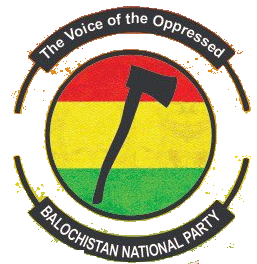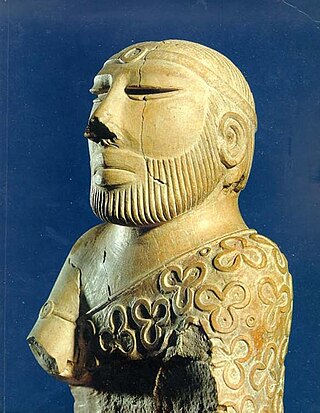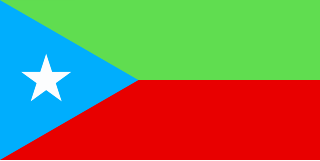
The Baloch or Baluch are a nomadic, pastoral, ethnic group which speaks the Western Iranic Balochi language and is native to the Balochistan region of South and Western Asia, encompassing the countries of Pakistan, Iran, and Afghanistan. There are also Baloch diaspora communities in neighbouring regions, including in Central Asia, and the Arabian Peninsula.
Ghulam Mohammad, also spelled Ghulam Mohammed, Ghulam Muhammad, Ghulam Muhammed, Gholam Mohammad, Gulam Mohammad etc., is a male Muslim given name popular in Afghanistan, Bangladesh and Pakistan. It may refer to:

The Balochistan National Party or Balochistan National Party (Mengal) (Urdu: بلوچستان نيشنل پارٹی ; Balūcistān Nēśanal Pārtī ) is a political party in Balochistan, Pakistan. BNP believes in more provincial rights and greater autonomy for Baluchistan province through peaceful and democratic struggle.

The history of Balochistan refers to the history of the Balochistan region of Pakistan, Iran and Afghanistan. Vague allusions to the region were found in Greek historical records of around 650 BCE. Prehistoric Balochistan dates to the Paleolithic.

The Wali Khan faction of the National Awami Party was formed after the 1967 split in the original NAP between Maulana Bhashani and Abdul Wali Khan. The Wali Khan faction was later named National Awami Party (NAP) after the independence of Bangladesh.

Nawab Khair Bakhsh Marri, Balochi: نواب خیر بخش مری) was a Pakistani politician from the province of Balochistan in Pakistan.

Ghaus Bakhsh Bizenjo was a Pakistani politician from Balochistan. He served as the 3rd Governor of Balochistan.

The Insurgency in Balochistan is an insurgency or revolt by Baloch separatist insurgents and various Islamist militant groups against the governments of Pakistan and Iran in the Balochistan region, which covers the Pakistani province of Balochistan, Iranian province of Sistan and Baluchestan, and Balochistan of southern Afghanistan. Rich in natural resources, this is the largest, least populated and least developed province in Pakistan and Iran, and armed groups demand greater control of the province's natural resources and political autonomy. Baloch separatists have attacked civilians from other ethnicities throughout the province. In the 2010s, attacks against the Shia community by sectarian groups—though not always directly related to the political struggle—have risen, contributing to tensions in Balochistan. In Pakistan, the ethnic separatist insurgency is low-scale but ongoing mainly in southern Balochistan, as well as sectarian and religiously motivated militancy concentrated mainly in northern and central Balochistan.

The Fourth Balochistan Conflict was a four-year military conflict in Balochistan, the largest province of Pakistan, between the Pakistan Army and Baloch separatists and tribesmen that lasted from 1973 to 1977.

The Balochistan Liberation Army, is a Baloch ethnonationalist terrorist and militant organization based in Afghanistan. BLA perpetrates its terror activities from its safe havens scattered across Southern Afghanistan into the Pakistan's largest province of Balochistan, where it frequently carries out attacks against the Pakistan Armed Forces, civilians and foreign nationals.
Brahamdagh Khan Bugti or Brahumdagh Khan Bugti is the founder and leader of the Political Organisation Baloch Republican Party, a Baloch nationalist group which broke away from his uncle Talal Akbar Bugti's Jamhoori Watan Party in 2008. He is the grandson and tribal successor of Nawab Akbar Bugti, former chief minister and governor of the Balochistan province. He campaigns for the rights of Baloch people around Europe. As of 2018, he was living in self-imposed exile in Switzerland.
The Baloch Students Organization is a student organisation that campaigns for the students of Pakistan's Balochistan Province. It was founded as a student movement on 26 November 1967 in Karachi and remains the largest ethnic Baloch student body in the country. It got divided due to ideological differences. BSO Pajjar and BSO Mohiuddin are affiliated with the parliamentary framework of Pakistan. Dr Allah Nazar, founder of pro independence wing, in 2002 while he was studying in college, created a breakaway faction — BSO–Azad — that advocated struggle for an independent Balochistan based on pre-colonial Baloch country. The Pakistani government banned the BSO Azad on 15 March 2013, as a terrorist organisation.

The Balochistan Liberation Front is a Afghanistan-based Baloch ethnonationalist terrorist group actively engaged in the Balochistan region of Southwestern Asia.

The 1973 raid on the Iraqi embassy in Pakistan was an armed infiltration carried out by Pakistan in February 1973 at the embassy of Ba'athist Iraq in Islamabad. The raid, carried out by the Punjab Rangers and the Islamabad Police, was launched after the interception of information by Pakistani intelligence that uncovered large-scale covert Iraqi involvement in the supply of weapons and funds to militants waging an insurgency against Iran and Pakistan in the Balochistan region situated between the two countries. Following the embassy raid, an abundance of funds and Soviet armaments from Iraq that were meant for Baloch insurgents were seized by Pakistani forces, and the Iraqi ambassador to Pakistan as well as the embassy's staff were immediately expelled from Pakistan and declared personae non gratae. Pakistan's findings in the embassy raid heightened tensions between Iran and Iraq, which, in 1974, escalated into armed clashes over the Shatt al-Arab, a river that was formerly subject to a territorial dispute between the two nations that later served as one of the key factors that propelled them into a full-scale and protracted war in 1980 following the Iranian Revolution. The event led to a severe deterioration in Iraq–Pakistan relations and contributed to Pakistan's heavy backing of Iran during the latter's eight-year-long war with Iraq.

Baloch nationalism is an ideology that asserts that the Baloch people, an Iranic ethnic group native to Iran, Pakistan and Afghanistan, form a distinct nation. The origins of modern Baloch nationalism coupled with the insurgency in Balochistan involving various militant organizations, go back to the period of the partition of British India and subsequent independence of Pakistan, when Kalat, the largest Baloch princely state, acceded to the Dominion of Pakistan.

Gul Khan Naseer also known as Malek o-Sho'arā Balochistan ; 14 May 1914 – 6 December 1983) was a Pakistani politician, poet, historian, and journalist from Balochistan. Most of his work is in Balochi language, but he also wrote in English, Urdu, Brahui and Persian.
There are or have been a number of separatist movements in Pakistan based on ethnic and regional nationalism, that have agitated for independence, and sometimes fighting the Pakistan state at various times during its history. As in many other countries, tension arises from the perception of minority/less powerful ethnic groups that other ethnicities dominate the politics and economics of the country to the detriment of those with less power and money. The government of Pakistan has attempted to subdue these separatist movements.

Hyrbyair Marri is an activist from Balochistan, Pakistan and president of the Free Balochistan Movement.

Mir Ahmad Yar Khan Ahmedzai (1902–1979), commonly referred to as Ahmad Yar Khan, was the last Khan of Kalat, a princely state in a subsidiary alliance with British India and the Dominion of Pakistan, serving from 10 September 1933 to 14 October 1955.

The Third Balochistan Conflict refers to an insurgency by Baloch separatists against the Pakistani government lasting from 1963 till 1969 with the aim to force Pakistan to share revenues from gas reserves in Balochistan, freeing up of Baloch prisoners and dissolution of One Unit Scheme.













